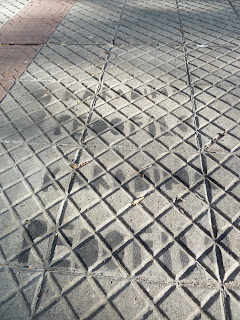One month after arriving I am going on holiday! My grandmother turns 90 years old and my sister and I are going to Buenos Aires for her birthday. We come back on Friday; short holiday. As part of the celebration I am allowing myself to complain about a few things. As my friends, you get to hear them.
The things that irritate me most...
1. Essays about current day politics and society that base their argument on something Plato or Aristotle said.
2. Essays that define concepts by telling you the etymology of the word. (together, #1+#2=99% of essays I've read here).
3. Being asked if I did that (live in the U.S., go to grad school, work in Madrid) "alone" (
¿y hiciste eso solita?). Not everyone is satisfied by the mention of my San Francisco brother, no one accepts friends as enough to free you from "alone", and amazingly ex-boyfriends or a fictitious current boyfriend are not what they are looking for either. It seems like only marriage and children can fully free you from "alone" here.
4. Being treated like a hero for having done that "alone".
5. Taxi drivers and bus drivers; mad men. To stop a bus at the bus stop, you must throw yourself onto the street. You can't read at the bus stop and then rely on your little arm to stop the bus. Throw yourself at the machine.
The things I am learning to live with....
1. The crazy amounts of children everywhere you go.
2. Being asked don't you what one (a child) too? I now respond in a very sweet voice: no, I am really enjoying my neice and nephew and don't see any need for me to have a baby too when everyone else is doing that already.
3. Cigarette smoke everywhere.
4. Service staff everywhere: my father's building has 24 hour staff at the door plus several cleaning and maintenace staff. Most apartments have a maid. Shops - even those with one client an hour - have one person at the cash register and another that gets you what you want to buy.
5. Very boring conversations about daily anecdotes: what happened when you got dressed this morning, the dog that looked at you walking down the street, the woman who slept through the earthquake and thought thiefs had broken into her house....
6. The mystery of the Chilean sense of humor. I just don't get it and its becoming more and more obvious that I don't get it. This may move up to the other list by next month...
7. People asking me about my work and then interrupting me with some "joke" or anecdote or another question about something completely different.
So its not too bad. Objectively, life here is very boring and were it not for my family, our nice apartment and bakery, my good memories from the past, and the hope of travels to the Andes, I might be in despair right now.
After dissing Chilean humor I leave you with some political humor. This photo is from a satirical journal. Some necessary cultural background: though the national myth is that there is one "Chilean race" racial differences do exist. The whiter you are the more more likely you are to come from the upper class, and vice versa. A very common topic of conversation is to mention that "my grandmother had blue eyes", "when I was little I was blond", "you wouldn't believe how light my uncle was" (I've been to three social events and in two of them these comments were heard). With that in mind...
 |
| Condoleeza Rice with President Piñera. It says "I have a black brother". Really the joke is on all Chileans, this is not specific to Piñera. It is making fun of the "arribismo" of Chileans. Arribismo is a pejorative term for people who want to climb the social ladder. |






_704x528.jpg)










